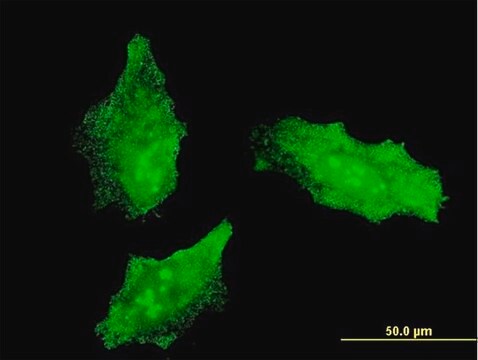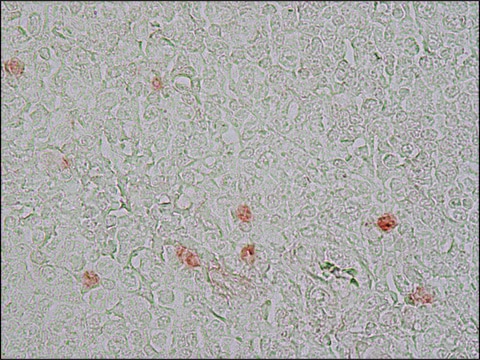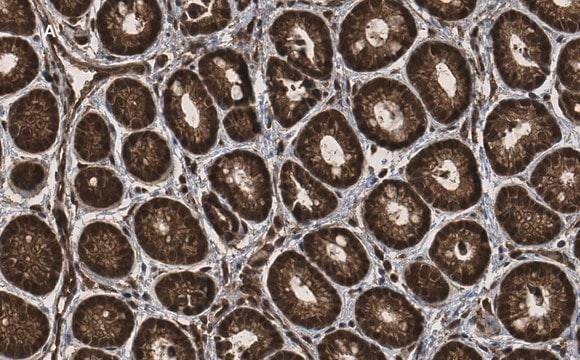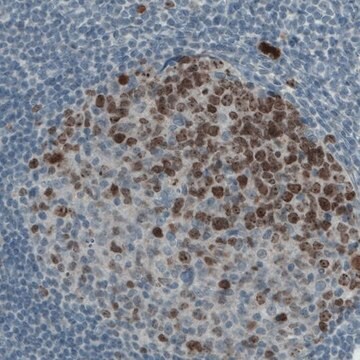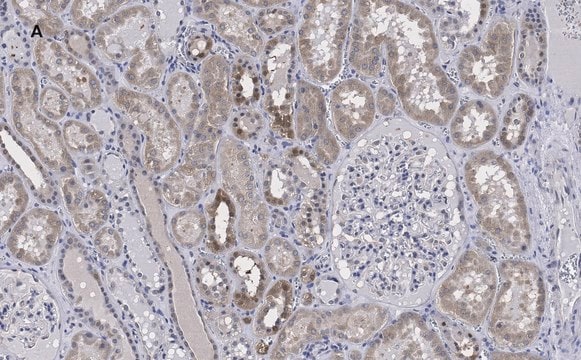ZRB1007
Anti-Ki67 Antibody, clone 1O15, ZooMAb® Rabbit Monoclonal

recombinant, expressed in HEK 293 cells
Synonym(e):
Antigen KI-67, Antigen Ki67, Antigen identified by monoclonal antibody Ki-67, Proliferation marker protein Ki-67
About This Item
Empfohlene Produkte
Biologische Quelle
rabbit (recombinant)
Qualitätsniveau
Rekombinant
expressed in HEK 293 cells
Konjugat
unconjugated
Antikörperform
purified antibody
Antikörper-Produkttyp
primary antibodies
Klon
1O15, recombinant monoclonal
monoclonal
Produktlinie
ZooMAb® learn more
Form
lyophilized
Mol-Gew.
calculated mol wt 358.69 kDa
observed mol wt ~350 kDa
Speziesreaktivität
human
Verpackung
antibody small pack of 25 μL
Grünere Alternativprodukt-Eigenschaften
Waste Prevention
Designing Safer Chemicals
Design for Energy Efficiency
Learn more about the Principles of Green Chemistry.
Erweiterte Validierung
recombinant expression
Learn more about Antibody Enhanced Validation
sustainability
Greener Alternative Product
Methode(n)
immunocytochemistry: suitable using 1:100
immunohistochemistry (formalin-fixed, paraffin-embedded sections): 1:100-1:400
western blot: suitable using 1:1,000
Isotyp
IgG
UniProt-Hinterlegungsnummer
Grünere Alternativprodukt-Kategorie
, Aligned
Versandbedingung
ambient
Lagertemp.
2-8°C
Posttranslationale Modifikation Target
unmodified
Angaben zum Gen
human ... MKI67(4288)
Allgemeine Beschreibung
Each ZooMAb antibody is manufactured using our proprietary recombinant expression system, purified to homogeneity, and precisely dispensed to produce robust and highly reproducible lot-to-lot consistency. Only top-performing clones are released for use by researchers. Each antibody is validated for high specificity and affinity across multiple applications, including its most commonly used application. ZooMAb antibodies are reliably available and ready to ship when you need them.
Learn more about ZooMAb® here.
Spezifität
Immunogen
Anwendung
Immunohistochemistry (Paraffin) Analysis: A 1:400 dilution from a representative lot detected Ki67 in human tonsil and human skin tissue sections.
Zielbeschreibung
Physikalische Form
Rekonstituierung
Lagerung und Haltbarkeit
Rechtliche Hinweise
Haftungsausschluss
Sie haben nicht das passende Produkt gefunden?
Probieren Sie unser Produkt-Auswahlhilfe. aus.
Lagerklassenschlüssel
11 - Combustible Solids
WGK
WGK 1
Flammpunkt (°F)
Not applicable
Flammpunkt (°C)
Not applicable
Analysenzertifikate (COA)
Suchen Sie nach Analysenzertifikate (COA), indem Sie die Lot-/Chargennummer des Produkts eingeben. Lot- und Chargennummern sind auf dem Produktetikett hinter den Wörtern ‘Lot’ oder ‘Batch’ (Lot oder Charge) zu finden.
Besitzen Sie dieses Produkt bereits?
In der Dokumentenbibliothek finden Sie die Dokumentation zu den Produkten, die Sie kürzlich erworben haben.
Kunden haben sich ebenfalls angesehen
Unser Team von Wissenschaftlern verfügt über Erfahrung in allen Forschungsbereichen einschließlich Life Science, Materialwissenschaften, chemischer Synthese, Chromatographie, Analytik und vielen mehr..
Setzen Sie sich mit dem technischen Dienst in Verbindung.


